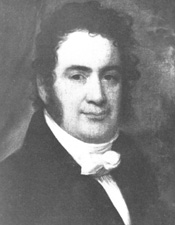Alexander Porter
Alexander Porter | |
|---|---|
 | |
| U.S. Senator from Louisiana | |
| In office December 19, 1833 – January 5, 1837 March 4, 1843 – January 13, 1844[a] | |
| Preceded by | Josiah S. Johnston, Charles Magill Conrad |
| Succeeded by | Alexandre Mouton, Henry Johnson |
| Associate Justice of the Louisiana Supreme Court | |
| In office 1821–1833 | |
| Preceded by | Pierre Derbigny |
| Succeeded by | Henry A. Bullard |
| Member of the Louisiana House of Representatives | |
| In office 1816-1818 | |
| Personal details | |
| Born | June 24, 1785 County Donegal, Ireland |
| Died | January 13, 1844 (aged 58) St. Mary Parish, Louisiana United States |
| Political party | National Republican Whig |
| Alma mater | Clemenceau College |
| Profession | Politician, lawyer, judge, planter |
Alexander Porter (June 24, 1785 – January 13, 1844) was an attorney, politician, and planter, who served as United States Senator from Louisiana from 1833 to 1837. Born in Ireland, he emigrated in 1801 at the age of 16 to the United States. He served a term in the statehouse from 1816 to 1818, and as a state Supreme Court justice from 1821 to 1833.
Biography
[edit]Early life
[edit]Born in County Donegal, Ireland, Alexander Porter immigrated to the U.S. in 1801 with an uncle, who settled in Nashville, Tennessee. He received a limited schooling, but attended the now-defunct Clemenceau College. He "read the law" as an apprentice and was admitted to the bar in 1807.
Career
[edit]In 1807, he commenced practice in Attakapas Parish, Territory of Orleans. (In 1811, the area around Franklin, Louisiana, became St. Mary Parish.) Porter was a delegate to the convention which framed the first Constitution of Louisiana in 1812. He was elected as a member of the lower branch of the Louisiana Legislature from 1816 to 1818.[2]
Alexander Porter served as a Louisiana Supreme Court justice from 1821 to 1833. In 1833, he was selected as a Whig to the United States Senate by the state legislature, to fill the vacancy caused by the death of Josiah S. Johnston. Porter served from December 19, 1833, until January 5, 1837, when he resigned due to ill health.
Porter returned to St. Mary Parish to practice law and manage his plantation, Oaklawn. He was again chosen by the legislature for the U.S. Senate, for the term beginning March 4, 1843; but he did not take his seat due to poor health. The legislature elected Henry Johnson, former governor of the state, to replace him.
Alexander Porter died in 1844. His remains were interred in Nashville City Cemetery, the location of the grave of his young wife, Evilina (Baker) Porter (1797–1819).[3]
See also
[edit]Sources
[edit]- ^ Was elected by the Louisiana Legislature to serve in the Senate for the term beginning March 4, 1843. Was unable to take his seat due to ill health, and never presented credentials to qualify for the seat. The Senate does not consider him to have served as Senator during this time, and lists a seat vacancy from March 4, 1843 to February 12, 1844.[1]
- ^ Senators from Louisiana
- ^ StoppingPoints.com. "Alexander Porter Historical Marker".
- ^ OaklawnManor.com, accessed April 22, 2016.
External links
[edit]- United States Congress. "Alexander Porter (id: P000436)". Biographical Directory of the United States Congress.
- Alexander Porter at Find a Grave
- 1785 births
- 1844 deaths
- Politicians from County Donegal
- Louisiana state court judges
- Members of the Louisiana House of Representatives
- United States senators from Louisiana
- Justices of the Louisiana Supreme Court
- Louisiana lawyers
- Farmers from Louisiana
- Irish emigrants to the United States
- 19th-century American planters
- Louisiana Whigs
- Louisiana National Republicans
- Whig Party United States senators
- National Republican Party United States senators
- U.S. state supreme court judges admitted to the practice of law by reading law
- 19th-century American judges
- 19th-century American lawyers
- 19th-century United States senators
- 19th-century members of the Louisiana State Legislature

